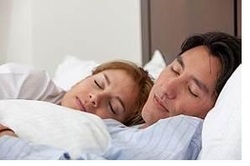 It’s not hard to find stories in the media about people who claim to be able to live their lives with little or no sleep. Some stories are meant to be sensational—a Vietnamese man reportedly spent the last 33 years without sleep and suffered no ill effects. Other stories just highlight quirky bits of research—one study found that short sleepers had a very low "worry index". For most of us, though, it’s very clear that sleep is a large and important part of life. We need a full night's sleep, and we suffer for it the next day when we don’t get it. So what can we do to help ensure that we get this much-needed rest? The answer is to be proactive. And that includes being proactive about the foods we eat. It turns out that what you put into your body can have a big impact on the quantity and quality of sleep that you get. One study by researchers at the University of Pennsylvania showed that eating poorly resulted in sleeping poorly. No surprise there, but what exactly should we eat? And what foods should we avoid?
There are several foods that can help us calm our body by increasing the production of serotonin. This chemical helps to regulate sleep. Other foods contain melatonin or tryptophan, each of which has been shown to increase our ability to rest. Still other foods, like lettuce, contain lactucarium, which possesses sedative properties. Among other substances that can help are the following: · Lycopene—found in tomatoes, grapefruit, watermelon and papaya · Selenium—found in tuna, cod, shellfish, halibut, plus nuts, turkey and barley · Vitamin C—found in strawberries, pineapple, papaya, broccoli, kale and bell peppers · Vitamin B6—found in tuna, salmon, halibut, pistachio nuts and raw garlic Some people find that it’s helpful to experiment with different foods to find out which ones help with sleep. If you’re interested in giving this a try, it’s best to eat 2–4 hours before bedtime so that you’re not kept awake by the increased blood flow in your digestive system. Waiting a couple of hours between the time you eat and the time you go to bed also allows the sleep-inducing compounds in the food to be absorbed into your system. Here’s a list of foods to experiment with… · Bowl of cold cereal and milk · Milk (warm) or other dairy products, like cottage cheese · Oatmeal · Honey · Peanuts or peanut butter · Walnuts · Almonds · Grapes · Watermelon · Grapefruit · Tomatoes · Papaya · Cherry juice (especially the tart kind) · Banana · Lettuce or kale · Herbal tea (non-caffeinated, like chamomile) · Miso soup · White rice · Tuna · Hard-boiled eggs · Shrimp and lobster · Elk (this game meat has twice as much tryptophan as turkey) There are also a number of foods you should avoid if you want to encourage a good night’s sleep: · Evening caffeine (such as tea, coffee or soft drinks after 6:00 pm) · Late-evening meals · More than a little alcohol (upsets natural REM sleep cycle) · Smoking (smokers typically take longer to fall asleep because of the nicotine stimulation) Also, take a tip from the "short sleeping elite"—don't worry. You may still need your full 7–8 hours of sleep, but not worrying will help you get there.
0 Comments
Leave a Reply. |
AuthorPosted by Dr. Babak Missaghi Archives
August 2017
Categories
All
|

 RSS Feed
RSS Feed
